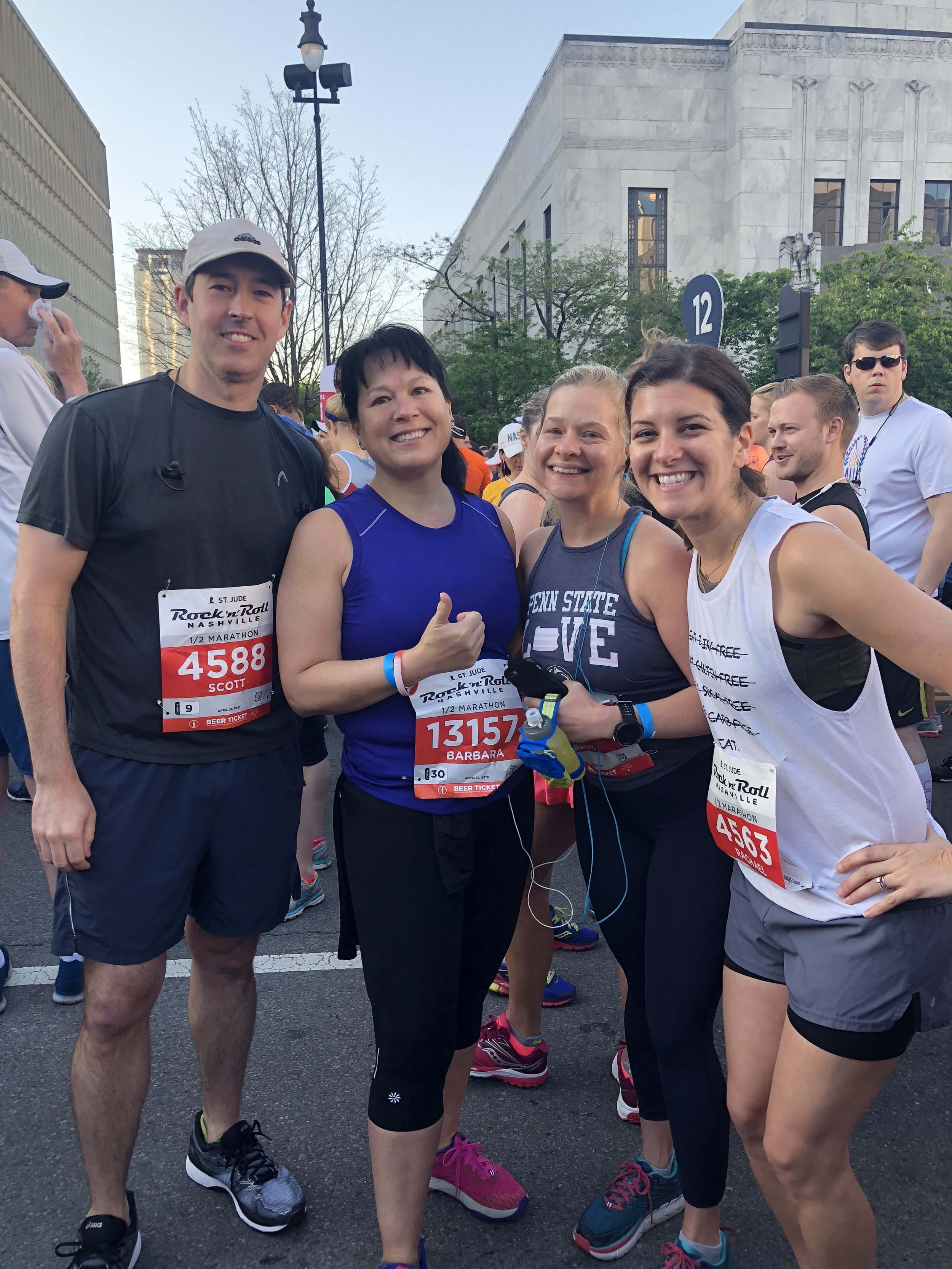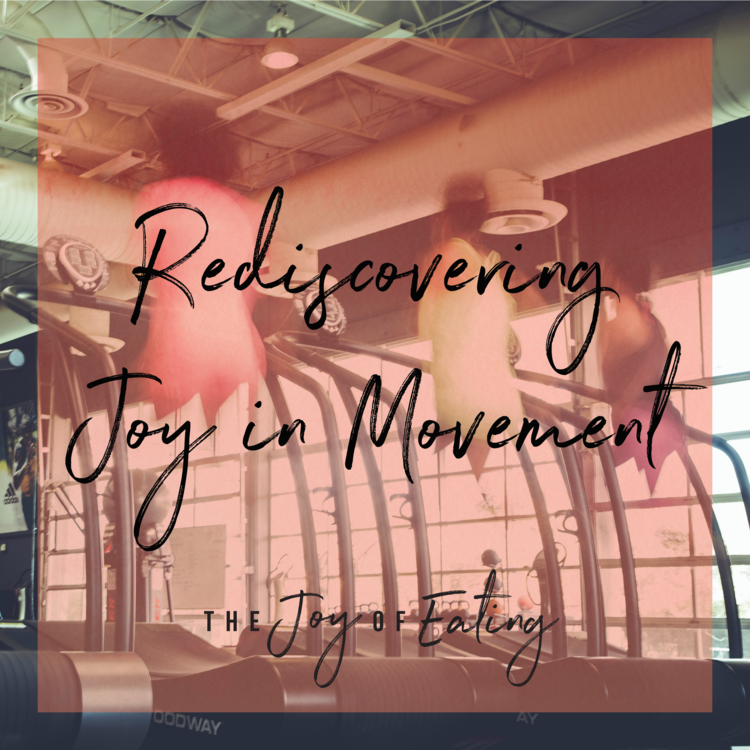Half Marathon Recap + Being Intuitive With Movement While Training For A Fitness Goal
Finally back home after spending a couple days last week in Ohio for a sponsored trip with Nestle, then the weekend in Nashville for the Rock ‘n’ Roll Half Marathon. I signed up for it last year after my stepmom decided to run it (her first!), so it was a perfect excuse to plan a trip to hang out with family and some of our best friends from college who live there.
Even though I ran cross country and track in high school, I’ve never been much of a runner. I was one of the slowest people on the team, and basically signed up because I felt like I needed to play a sport. I tried to pick up running a few times in the years since, but it wasn’t until I a.) discovered mindful movement, b.) dropped expectations about how long/fast I *should* be able to run, and c.) started listening to serial podcast that I started to actually enjoy it. I’ve learned that I really love exploring cities on foot, including my own, and that running is usually a good stress relief for me.
The hubs and I post run. Obvs I wore my Body Over Mind shirt to spread the non-diet word on my run.
When I signed up for my first half marathon a few years ago, I was SUPER rigid in my training schedule. As someone who couldn’t run 3 miles without stopping before training, I was really nervous about it. So, I followed my training schedule to a T, rarely skipping or cutting short a training run, even if that meant running late at night or when it was raining. I also had a free membership for barre classes at the time, so I felt like I had to also take advantage of that. There were many days I exercised twice a day. In hindsight, I was definitely overexercising, even though it was stemming from a combination of frugality and a fear of the unknown, not a disordered mindset. Still, it was pretty hard on my body. I constantly felt sore and was having a lot of stomach issues at the time, and I wonder if it was related to the overexercise.
My second half marathon, I wasn’t as nervous about what to expect, and was MUCH more flexible with my training. Although I used my schedule as a guide, I frequently switched up days, cut runs short, or skipped workouts entirely if I didn’t have time. I also wasn’t doing barre at the time either. What’s funny is I actually shaved 15 minutes off my time, despite training less.
My stepmom ran her first half marathon, wonky knee, blisters on her feet and all!
As the training start date for this half drew near, I just wasn’t feeling running the way I usually do. Some days I was excited to run, but other days I was pushing myself out the door. Sometimes I came back feeling glad I made myself go, but other days I was just happy the workout was over. I also had a lot going on the past few months, between work and volunteer commitments, and really trying to stick to a cut off time for work at night.
When I first signed up the half, I had told myself I wanted to PR. But as training started, I had to come with grips with the fact that it just wasn’t going to happen. I had to be flexible and revise my training goals to just do enough to be able to have fun at the race and not feel miserable.
We're fired up and ready to go!
Mission accomplished. Although my body was definitely not feeling awesome at miles 10+, I was able to stick with Scott and just take a few walk breaks on some tedious hills. I even sprinted to the finish (but only because I wanted to beat my husband, even if only by a second – our marriage in a nutshell). Most of all, I had a blast, and felt really connected with my body and the energy of the race the whole time.
My experience training for this half got me thinking a lot about how to be intuitive with movement while training for race or some other fitness goal. It’s a question I’ve been asked on occasion by clients, and I think it can be tricky to navigate for anyone, especially someone who has struggled with disordered eating or exercise in the past.
Stopping for shots of beer on our run because WHY NOT?
Here’s some thoughts and questions to ask yourself if you’re in a similar place.
What’s your motivation?
If you’re a professional athlete, a rigid and intense training schedule makes sense, because achieving the shortest time/most points/etc is your job. Hopefully if that’s the case, you get enough joy out of your sport that it makes pushing through those off days worth it. But otherwise, what does your goal really mean for you. If you’re going to do something that requires not being super intuitive with your movement, then it makes sense to question your goals to see why it’s important for you. For me, my goal with my first half marathon was to be able to run the whole time. That was important to me, because I really wanted to shatter the perception I had of myself as not athletic after always being one of the slowest/least skilled in every sport I played. With this last half I ran, my original goal was to run in under two hours, but when I questioned that goal, I realized it was just for bragging rights, which really wasn’t a worthwhile goal for me.
Can you be flexible with your goals?
Life changes. Injuries happen. Can you be flexible with your goal if your situation changes? When I realized my volunteer commitments were going to make it impossible to keep up with a training regimen to run a sub 2 half, I had to flexible with my goals and take a step back.
Are you allowing yourself time to rest?
No matter how much training your goal requires, your body still needs time to rest. Are you able to train without pushing yourself to the point of exhaustion and injury? Are you able to listen to your body and give it some rest when it’s asking for it, even on days when rest is unplanned. One of the days I had a moderate run planned, I noticed my legs felt like lead, and my body was cramping from dehydration after running just a couple blocks. I stopped running, walked back to my house, and let my body rest. If that happened in my first training cycle, I’m sure I would have pushed through with a run/walk that felt miserable the whole time.
When you’re training for a specific fitness goal, I don’t think it’s reasonable to expect to always be in the mood for training, and that’s OK. Being prepared may mean not being 100% intuitive with your movement, and relying on some good ‘ole willpower to get those running shoes on. Intuitive movement is a lot like intuitive eating, in that you're listening to your body, but also using logic to make decisions. Just like intuitive eating is so much more than "eat whatever you want," intuitive movement is more than "do whatever you want." I think to be able to train for a fitness goal in a safe way, we have to be able to find that balance between listening to what our body wants in the moment, and thinking about what our body needs to be prepared.
Now that I’m done training for this race, I think I’m going to take a break from running for a bit, until I start craving it again. It’s normal to go through phases with exercise, and lately I’m just not feeling running. The hubs and I both got kayaks this winter, so I’m really looking forward to going out on the lake and river now that it’s warm. I’m also weirdly in the mood for more intense boot camp style classes, which is usually totally not my style. So I may sign up for a month of classes at a gym and see how I like it. I also really miss yoga classes, which I didn’t have as much time for while I was training for my half, so I’m excited to get back to that.
If this was a topic that resonated with you, my friend Robyn also wrote a great post on this, so check that out too. And I’d love to hear from any of you guys in the comments who have trained for a fitness goal on your experience, whether you felt like you were able to be intuitive with your movement, or not.
More on mindful and intuitive movement:








